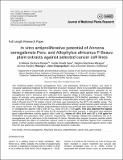| dc.contributor.author | Biseko, Emiliana Zacharia | |
| dc.contributor.author | Swai, Hulda | |
| dc.contributor.author | Mbugua, Regina Wachuka | |
| dc.contributor.author | Ndung’u, Jecinta Wanjiru | |
| dc.contributor.author | Chepng’etich, Jean | |
| dc.contributor.author | Gathirwa, Jeremiah | |
| dc.date.accessioned | 2020-12-17T07:29:11Z | |
| dc.date.available | 2020-12-17T07:29:11Z | |
| dc.date.issued | 2019-07-10 | |
| dc.identifier.uri | https://doi.org/10.5897/JMPR2019.6785 | |
| dc.identifier.uri | https://dspace.nm-aist.ac.tz/handle/20.500.12479/1059 | |
| dc.description | This research article published by Journal of Medicinal Plants Research, Vol. 13(13), 10 July, 2019 | en_US |
| dc.description.abstract | The medicinal plants Annona senegalensis Pers. and Allophylus africanus P Beauv. are used in
Tanzania traditional medicine for the treatment of cancer. However, there is no scientific documentation
on their therapeutic effectiveness. The present study evaluated antiproliferative potential as an
indicator of anticancer activity of A. senegalensis and A. africanus plant species from Tanzania. A.
senegalensis and A. africanus were collected from Ugweno village at Kilimanjaro, Tanzania. Different
types of extracts were prepared in dichloromethane/methanol (DCM:MeOH), petroleum ether, DCM,
ethyl acetate (EtOAc), MeOH and water respectively. Antiproliferative activity against HCC 1396 (breast),
HEp-2 (throat) and CT 26 (colon) cancer cell lines was assessed by the MTT cell viability assay. The
results of the present study showed that the antiproliferative activity varied between plant extracts and
the cancer cell lines. The highest antiproliferative activity was achieved with petroleum ether extract of
A. senegalensis against HEp-2 with an IC50 value of 0.42 ± 0.09 μg/ml. This also depicted the highest
selectivity to cancerous cells (SI value 94.19) compared to the other extracts. A. africanus also depicted
good antiproliferative activity against HEp-2 with IC50 values of 1.00 ± 0.41 and 2.37 ± 1.45 μg/ml for
DCM:MeOH and petroleum ether extracts, respectively. The findings validate the traditional use of A.
senegalensis and A. africanus in the treatment of cancer. Results also support previous studies which
demonstrated the effect of extraction solvent used in extraction of bioactive agents from medicinal
plants. Further studies involving the isolation of pure antiproliferative compounds against cancer cells
from the two plants are recommended to elucidate bioactive molecules. | en_US |
| dc.language.iso | en | en_US |
| dc.publisher | Journal of Medicinal Plants Research | en_US |
| dc.subject | Annona senegalensis | en_US |
| dc.subject | Allophylus africanus | en_US |
| dc.subject | Antiproliferative | en_US |
| dc.subject | Cancer cells | en_US |
| dc.subject | Plant extracts | en_US |
| dc.title | In vitro antiproliferative potential of Annona senegalensis Pers. and Allophylus africanus P Beauv. plant extracts against selected cancer cell lines | en_US |
| dc.type | Article | en_US |

